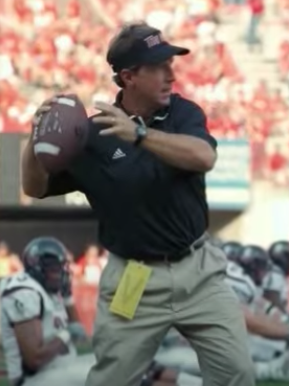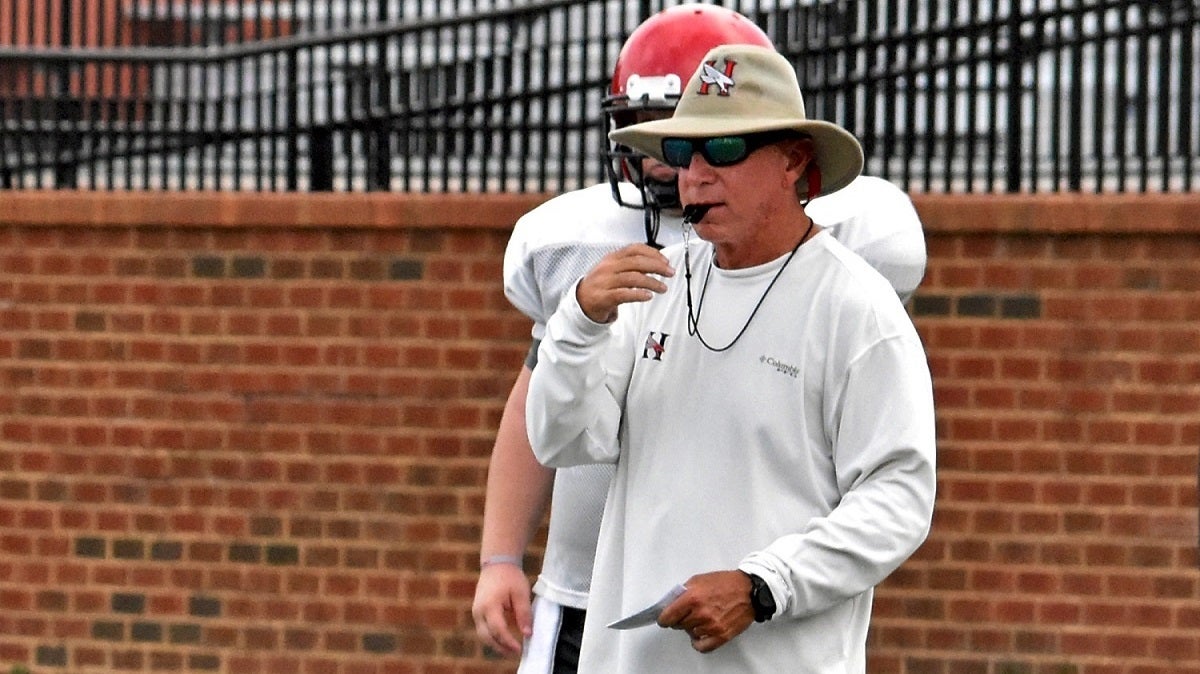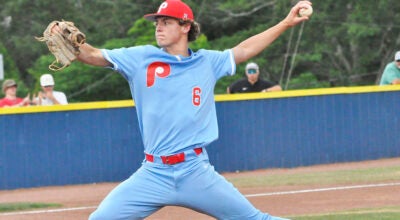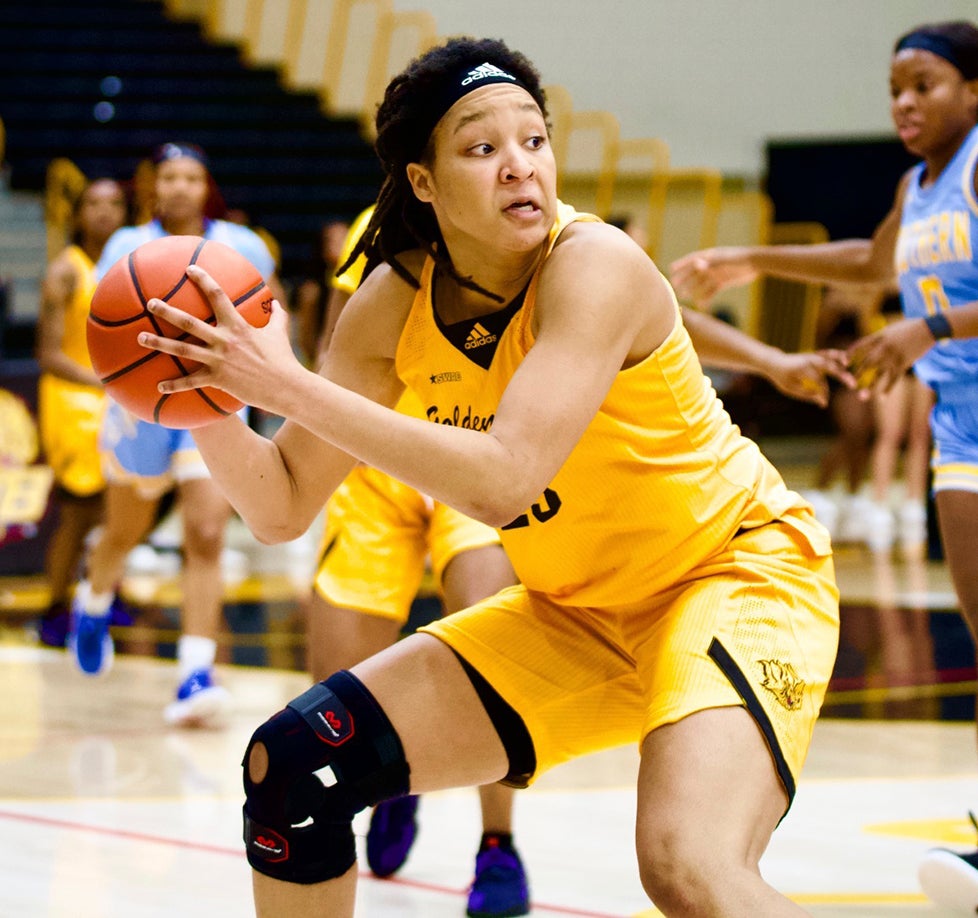The Legend of Troy Hall of Famer Mike Turk
Published 11:39 am Friday, June 30, 2023
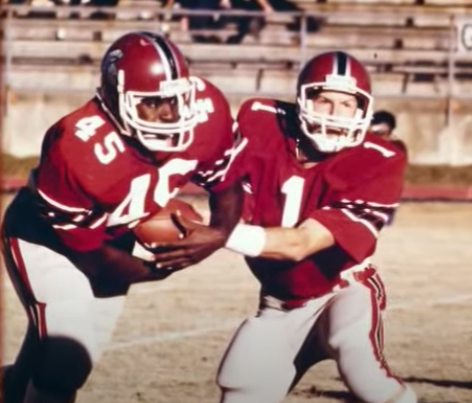
- Mike Turk is one of the most decorated players in Troy history.
|
Getting your Trinity Audio player ready...
|
As Troy University football legend Mike Turk is heading into his 20th year as the head coach of Huntingdon College, the Hall of Famer spoke with The Messenger about his career from an undersized walk-on quarterback to a national champion and beyond.
Turk grew up in Montgomery and despite his 5-foot-6-inch, 135-pound frame; he was a star player at Jeff Davis High School. Despite his success on the field, Turk received no scholarship offers and even little interest as a walk-on.
“I didn’t have a lot of options,” Turk said of his decision to come to Troy. “No one really recruited me but some coaches from Troy had talked to me about walking on.
“I didn’t really know what I wanted to do, honestly. I was heartbroken that I didn’t get recruited or offered anything by anyone. Then, baseball season came and went and nothing happened there either. I didn’t do anything that first fall after I graduated from high school, as far playing.”
Turk attended Auburn-Montgomery – just as a student – the fall after graduated from high school but a position as a volunteer coach at his alma mater made him rethink his football career.
“I helped my high school coach at Jeff Davis and I figured out pretty quickly that I missed playing,” Turk said. “Troy was the only school that had offered me anything and Chan Gailey had taken the job there and was running the ‘wish bone.’ I wasn’t exactly what you would call an option quarterback in high school but I was definitely closer to being one than being a drop-back quarterback.
“So, it felt like a good fit. I reached out to them and came down and watched a game that fall and enrolled in January and went through the offseason program and spring ball.”
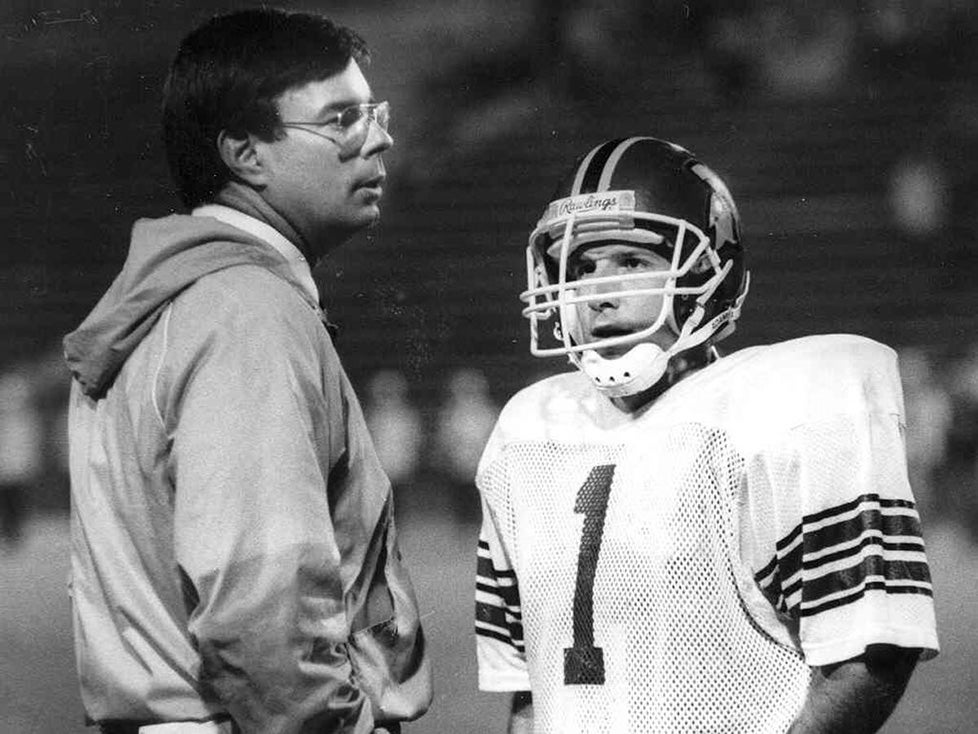
Coach Rick Rhoades, left, and quarterback Mike Turk, right, guided the Trojans to the 1987 National Championship. (Photo courtesy of Troy University Athletics)
Once arriving at Troy, Turk was listed as seventh string on the Trojan depth chart at the start of spring practices.
“By the end of the third week I had worked my way up to No. 2 on the depth chart,” Turk recalled. “The very first practice after I was named No. 2, (starting quarterback) Carey (Christensen) hurt his knee and I ended up in the huddle with the first string guys.”
That development would come up big during his true freshman season. In the third game of the season, Christensen broke a bone in his foot, thrusting Turk into the starting role.
“As the backup quarterback, you try to prepare yourself everyday in case that happens but I wasn’t ready for it,” Turk recalled. “I had no choice but to get ready for it pretty quickly, though. There were so many older guys on that team that took me under their wing and got me through the first part of it, which was the roughest part. That really is what made the difference for me.
“When it happened that fall it kind of had already happened (in the spring). All of those guys had seen me (in the huddle) before. I wasn’t the guy just running the twos. I had been out there with them the last couple of weeks during spring. The good Lord had his hand on it, there is no doubt about that.”
During the next six weeks, Troy went 5-1 with Turk under center. Turk said that Christensen, even from the sideline, was one of the veterans that played a hand in his development.
“We had a really good relationship,” Turk said of Troy’s starter. “Carey took me under his wing. We were only teammates for a year but our relationship grew a lot. We roomed together on the road and he took good care of me. He was at every practice and every game constantly coaching me, which I am not only appreciative of but I needed.”
Turk ended up winning Conference Freshman of the Year as he amassed 989 yards and five touchdowns through the air, along with 556 yards and eight touchdowns on the ground. Christensen returned to the team with two games remaining in the regular season and he and Turk split the quarterback duties for the remainder of the season, all the way through to a National Championship.
“The thing I remember most about that first year – and winning that national championship – was that it was for the seniors on that team,” said Turk. “I was excited because I was on the team but I was really excited for those guys. Their freshman and sophomore seasons had to have been miserable. I think they won five games those two years combined.
“They went through a coaching change and survived all of that and held it together and reaped the benefits of that just two short years later. They deserved that and I was glad I got to be a part of it.”
Turk and the Trojans failed to make the playoffs in his sophomore campaign but bounced back to reach the semifinals before losing to South Dakota in 1986. Turk said that the failures in his sophomore and junior seasons had as much of an impact on him as winning the title as a freshman.
“My freshman year we won it and I thought we were just supposed to win it every year,” Turk said. “We didn’t even make the playoffs the next year and lost in the semifinals the next. I think I appreciated it more my senior year because I knew both sides of it by that point. I knew what it was like to win one and what it was like not to win one, or even reach one. The fact that we were able to get back there and win the game and accomplish that again was very satisfying and something that we are all really proud of.”
The 1987 National Championship team started the season as the No. 3-ranked team in the country but proceeded to go 0-1-1 in the first two weeks, with a loss to Northeast Missouri State and a tie with Nicholls State, before tearing through the remainder of the season. In the final 12 games of the season, Troy outscored its opponents 433-131 and defeated teams by double-digit points in all but two of those contests. The Trojans were at their best when the playoffs arrived, thrashing Winston-Salem 45-14 in the quarterfinals, dominating Central Florida 31-10 in the semifinals and thumping Portland State by a score of 31-17 in the National Championship. Turk said those early setbacks are what set Troy up for one of the most dominant runs in Division II history.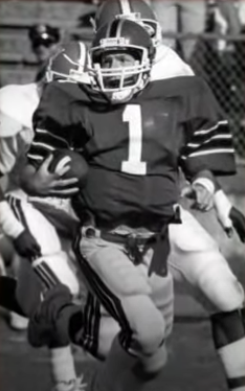
“I can remember coming back from (Nicholls State) after that tie and myself and Steve Campbell – our center – were having a conversation on the bus about how disappointed we were with how we had started the year,” Turk recalled. “Still, we both kind of felt the same way in that there is something about a team that when you’re undefeated it’s kind of like everyone is waiting for you to make a mistake or stub your toe along the way, but we had already done that.
“I said, ‘If you think about, Steve, there is nothing more scary than a team that has already been through a rough patch and is just getting better every week and starts rolling.’ That’s exactly what that team did. We steamrolled the rest of the season and into the playoffs and through the national championship.”
As successful as the team was that season, Turk put together one of the best individual seasons in school history. He rushed for a career-high 930 yards and 10 touchdowns along with a career-high 1,460 yards and 10 touchdowns through the air. Turk also rushed for 190 yards in the National Championship Game, which was a record for that game.
He finished the season as the runner-up for the Harlon Hill Trophy – Division II’s equivalent to the Heisman – and earned All-American, All-Gulf South, Gulf South Player of the Year and Division II Offensive Player of the Year honors. Turk was also the first player to ever win both the Alabama Sports Writers Association (ASWA) Athlete of the Year and Small College Athlete of the Year in the same season.
Turk finished his playing days ranked as the second-leading rusher in Troy history, as well as being ranked second in rushing touchdowns. Currently, he’s still No. 6 in rushing yards all-time, No. 4 in rushing touchdowns, No. 8 in passing yards and No. 9 in passing touchdowns.
Long before his playing days were over, Turk knew what the next chapter in his life would hold.
“Very early on I knew I wanted to coach,” Turk remembered. “I don’t know exactly when but it was probably around junior high school. I had a couple of coaches in junior high that had a real impact on me, things that I learned from them I still use to this day.
“That first fall after I graduated (high school), I got my first taste of coaching. It was probably then and there that I knew there was no doubt about what I wanted to do with my life when I got through playing.”
After his playing career ended, Turk joined the Troy staff as a student assistant and then spent two seasons as a graduate assistant.
“I had just finished graduate school when Coach (Larry) Blakeney was hired in December of 1990 and he offered me my first full-time job,” Turk said. “I was able to stay there in Troy for 13 more years with him. You name it, I did it.”
Turk spent a total of 19 years at Troy University, as a player and coach.
“You don’t ever really think you’ll stay anywhere that long in this profession,” Turk said with a laugh. “I would have never dreamed, honestly, that I would have been at Troy for 20 years when I left to go down there in January of 1984.”
In 2004, Turk accepted the position to take over as head coach at Huntingdon College in his hometown of Montgomery. Huntingdon, a Division III school, had just launched its football program the prior year. Only two coaches have ever coached the Hawks during the 20 years of its existence, Turk has coached 19 of those seasons. In his 33 years as a full-time coach, Turk has had a total of two jobs, a rare occurrence in the world of college coaching.
“As I tell people all the time, I’ve never been one to look too hard across the fence,” Turk emphasized. “A wise man told me a long time ago, ‘If the grass is greener on the other side of the hill, you probably need to be working harder and fertilizing yours more.’
“There’s not many guys like me in this profession that have just had two jobs their whole life, but I don’t regret any of it. I’m thankful for it, in fact.”
In 19 seasons at the helm, Turk has a 131-58 record during his career. His teams have made Division III Playoff appearances a total of eight times and have won eight or more games seven times with seven conference championships.
That success, though, has been a true building process. In Turk’s first 10 years as a head coach, Huntingdon made just one playoff appearance. Since 2013, the Hawks won a school record 10 games in 2015, won nine or more games in three straight seasons and have won conference championships – and made the playoffs – in seven of the last eight seasons. In 2022, Huntingdon went 9-2 and once again made the playoffs.
“We’ve been blessed with some good coaches and good players and it’s surely more fun to win than it is to lose,” Turk said. “I’m very thankful for the success we’ve been able to have.”
That success comes despite having zero scholarship players. Division III schools cannot offer scholarships, making Huntingdon’s success on the field that much more impressive.
“We get great support here from our administration and the students and there is some really good players in this area,” Turk said. “They may be an inch too short or half a step too slow to get a scholarship but they’re really good football players and they want to play.
“I knew from beating the bushes as an assistant at Troy, there were a lot of good kids who were really good players that we just couldn’t take (at Troy) for whatever reason. I knew there would be a lot of players that would be available to us.”
As an undersized player, with no scholarship offers out of high school, Turk is able to relate to the players he recruits.
“I make the joke all the time, but it’s really the truth, that I wouldn’t have recruited me either,” he said with a laugh. “I was 5-foot-6-inches and weighed 135 pounds when I graduated. Who wants that guy? That’s the beauty of what we’re able to do here, though.
“We’re able to take guys like that and coach them up and give them the chance to develop and grow up and watch them become not just good players, but also outstanding men that graduate and go on to do wonderful things in the community and that’s the most satisfying part of the job.”
Turk also pointed to the continuity he’s been able to have among some key positions on the coaching staff, both with Troy connections. Charlie Goodyear played at Troy under Turk and was one of his first hirings after getting the job at Huntingdon. He served as the football team’s strength and conditioning coach and offensive line coach for a number of years before becoming the strength and conditioning coach for the entire athletic department. Steve Hicks worked as a student-assistant at Troy in Turk’s final season with the Trojans, helping Turk coach the running backs. Turk brought Hicks with him to Huntingdon and he’s served as the school’s defensive coordinator since 2006.
“The continuity of having those two guys has been really big,” Turk emphasized. “Coach Hicks is in charge of the defense, I run the offense and Coach Goodyear runs the weight room. That’s three pretty important positions on the staff that has been a steady continuity to what the kids are expecting. That’s one of the biggest challenges in this profession, especially at this level, being able to have any kind of continuity. I’m very fortunate those guys are still here with us.”
At 58-years-old, Turk says he has no intention of slowing up any time soon but he also doesn’t have any grand goals for his program. He just wants his team to get better, every single day.
“We’re scratching and clawing every day to try and find a way to get better. I’m pretty simpleminded when it comes to stuff like (goals),” he said. “I don’t have a long list of goals in the locker room or anything like that. I’m not a guy that says, ‘In four years we want to be here’ or, ‘In six years we want to be here.’
“Honestly, we said a long time ago that we’re trying to get one day better every day. I think, for the most part, we have been able to do that. I think overall our program has continued to improve over the years and that’s all we’re trying to do; making sure we’re better tomorrow than we were today.”


